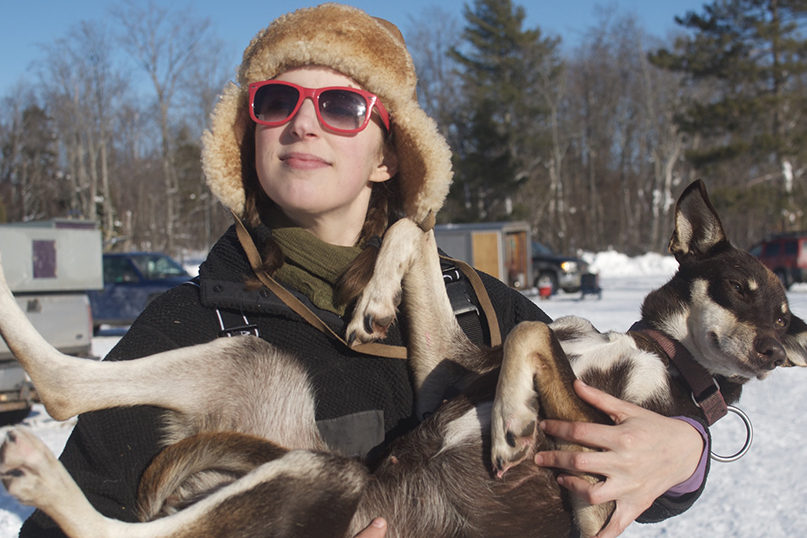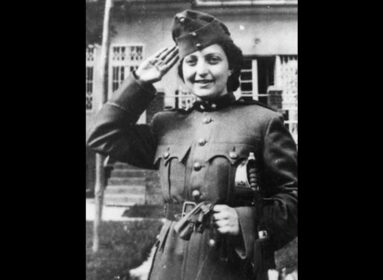
By Emily Burack
(JTA) – Writer and adventurer Blair Braverman appears to be the second Jewish woman to complete the historic Iditarod sled dog race, finishing the grueling 1,000-mile course in 13 days, 19 hours, 17 minutes and 2 seconds.
The 30-year-old musher crossed the finish line Sunday, March 17 in Nome, Alaska, in 36th place. Her sled was pulled by 14 dogs.
“WE DID IT!!!!!!” she tweeted Sunday. “It was the hardest thing I’ve ever done. And also the most beautiful. The dogs and I took care of each other the whole way. Stories to come, but for now we plan to nap (and eat) for days. All dogs and humans are doing great.”
Braverman grew up in Davis, California, and now lives in northern Wisconsin with her husband, Quince Mountain. They run BraverMountain Mushing (a portmanteau of their names).
On Twitter, where she has a dedicated following of over 70,000 people, Braverman shares her life raising dogs, racing and being the only Jew in her rural Wisconsin community. She’s become somewhat of an internet sensation: Her fans call themselves the “Ugly Dogs” following a Twitter troll that told Blair to “Go back to your ugly dogs, Karen.”
Twitter Ads info and privacy
She reminds her followers time and again that all her sled dogs are Jewish (with the exception of one). As she told Alma, “they are proud Jewish sled dogs.” She also tweets about feeling “like a Jewish grandmother” when she watches her dogs eat.
“My dogs are my family,” she wrote in Vogue. “I love them like pets, but we also have a different, deeper connection that comes from relying on each other in the wilderness. That bond with my dogs – the love we share and the things we can do together – is the whole point of all of this.”
Braverman received her master’s degree in nonfiction writing from the University of Iowa. In 2016, she published her memoir, Welcome to the Goddamn Ice Cube: Chasing Fear and Finidng Home in the Great White North, about navigating the Arctic as a woman. She also writes an advice column for Outside magazine called “Tough Love,” and has contributed to Vogue, BuzzFeed, Smithsonian and others.
“I’ve lived in places where I’m the only Jew, particularly in rural Norway. And it’s dangerous, I think, for people to think they’ve never met certain kinds of people. Like if you think you don’t know any queer folks, or immigrants, or Jews – that’s how groups of individual humans are reduced to symbols and ideas. If I know someone, if I’ve lived with them, I don’t want them to be able to tell themselves that they’ve never met a Jew,” Braverman told Alma.
Braverman joins a small group of Jews to have completed the Iditarod, now in its 47th year. In 2009, the Forward reported that 11 Jews have raced in the competition’s history; JTA could not independently verify that statistic.

Susan and Jim Cantor, with Woodrow, a golden retriever/Irish setter, on their wedding day, Dec. 26, 1983. Susan Cantor via The New York Times
The first Jewish woman to finish the Iditarod sled dog race was Susan Cantor, who completed the race in 1992. Cantor completed the grueling 1,000-mile course in 14 days, 1 hour, 42 minutes and 42 seconds. She finished in 37th place.
In a telephone interview with JTA, Cantor, who lives in Chugiak, Alaska, confirmed that she was most likely the first Jewish woman to have finished the race.
Even though her husband had competed in the race the year before, Cantor told JTA, “I entered the Iditarod with more than the usual trepidation as I had recently been diagnosed with multiple sclerosis. Happily that was not a factor in my race nor in my life. I truly believe running Iditarod changed the course of my illness, giving me strength and new focus. I’ve enjoyed decades mushing with my dogs and my family.”
In The New York Times last fall, in a feature asking readers to submit pictures of dogs and weddings, Susan and Jim Cantor submitted a wedding photo with one of their dogs.
As they wrote captioning the photo, “Woodrow was our first dog. He moved with us from the University of Michigan to Alaska, back to Cornell University, and again to Alaska. He was an enthusiastic member of our early sled dog teams, a hobby we have kept up for 37 years. At our wedding, the rabbi would not allow Woodrow into the sanctuary, but he was allowed to attend the reception in the temple’s social hall. Woodrow’s checkered vest and bow tie were very stylish for 1983.”
Cantor is still deeply involved in the mushing community in Alaska; she’s on the board of directors at Chugiak Dog Mushers Association. Her children, now ages 21 and 24, raced with the junior mushers.
She also is involved in the Alaskan Jewish community: Cantor works as an event coordinator for Congregation Beth Sholom in Anchorage and is involved with Hadassah.
“Our synagogue once had fun with that, raffling off the opportunity to ride in a dogsled with a lifetime member of Hadassah!” she jokes.
Braverman, whom JTA at first reported was the first to complete the legendary race, never claimed to be the first Jewish woman to finish Iditarod, and following the race alerted her Twitter followers about Cantor’s achievement.
And how does Cantor feel about Braverman, whose Twitter feed has made her one of the most recognized faces in the sport?
“I think it’s exciting Blair finished; she seems to be doing a great job as an ambassador for the [Iditarod] race and the Jewish community,” Cantor said.
She added, “When I saw Blair come in on TV, she reminded me of myself.”
The feelings are mutual.
“I’m very proud to be in her company,” Braverman tweeted.
CAP: Blair Braverman, 30, says all her sled dogs are Jewish – with the exception of one. (Christina Bodznic)







 Southern New England Jewish Ledger
Southern New England Jewish Ledger














